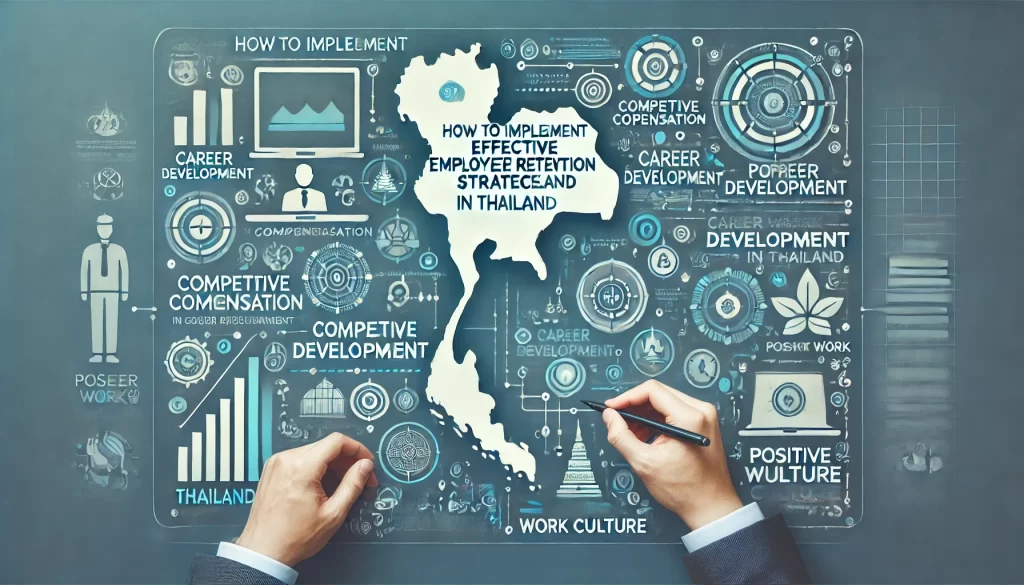In a bustling Bangkok office, a talented Thai employee hands in their resignation. The HR manager sighs, knowing this scenario is becoming all too familiar. Employee retention in Thailand is a growing challenge, with companies struggling to keep their best talent in an increasingly competitive job market. 🇹🇭💼
But what if there was a way to turn the tide? Imagine a workplace where employees feel valued, motivated, and excited to contribute their skills day after day. This isn’t just a dream – it’s achievable with the right strategies tailored to the unique Thai work culture. From offering competitive compensation packages to fostering a positive work environment, there are numerous ways to boost employee loyalty and satisfaction.
In this blog post, we’ll explore seven key areas that can transform your company’s approach to employee retention in Thailand. We’ll delve into understanding Thai work culture, developing career growth opportunities, and even tailoring strategies for different generations. By the end, you’ll have a comprehensive toolkit to implement effective retention strategies that resonate with your Thai workforce. Let’s dive in and discover how to keep your top talent engaged and committed for the long haul! 🚀
Understanding the Thai Work Culture

A. Valuing relationships and harmony
In Thai work culture, relationships and harmony are paramount. Thai employees often prioritize maintaining positive connections with colleagues and superiors over individual achievements. This emphasis on interpersonal relationships creates a unique workplace dynamic that foreign companies must understand to implement effective retention strategies.
- Key aspects of relationship-building in Thai workplaces:
- Face-saving (kreng jai)
- Indirect communication
- Group-oriented decision-making
- Social activities outside work
| Thai Value | Western Equivalent | Impact on Retention |
|---|---|---|
| Kreng jai | Diplomacy | Reduces conflict, increases loyalty |
| Indirect communication | Direct feedback | Requires careful interpretation |
| Group harmony | Individual achievement | Fosters team cohesion |
B. Respecting hierarchy and seniority
Hierarchy and seniority play crucial roles in Thai organizational structures. Respect for authority and age is deeply ingrained in Thai culture, influencing workplace interactions and decision-making processes. Understanding and adapting to this hierarchical system is essential for foreign companies operating in Thailand.
- Ways to show respect in Thai workplaces:
- Using appropriate honorifics
- Deferring to senior colleagues
- Avoiding public criticism of superiors
- Recognizing achievements of senior staff
C. Embracing work-life balance
While Thai employees value hard work, they also prioritize work-life balance. This cultural aspect is crucial for employee retention strategies in Thailand. Companies that demonstrate respect for personal time and family obligations are more likely to retain their Thai workforce.
Offering Competitive Compensation Packages

A. Conducting regular salary surveys
To ensure your compensation packages remain competitive in the Thai job market, conducting regular salary surveys is essential. These surveys provide valuable insights into industry standards and help you make informed decisions about employee remuneration.
- Frequency: Conduct surveys annually or bi-annually
- Scope: Include local and multinational companies in Thailand
- Data points: Gather information on base salaries, bonuses, and benefits
| Survey Type | Advantages | Disadvantages |
|---|---|---|
| In-house | Cost-effective, tailored | Time-consuming, potential bias |
| Third-party | Comprehensive, unbiased | Expensive, less industry-specific |
B. Implementing performance-based bonuses
Performance-based bonuses are an effective way to motivate employees and reward high achievers. In Thailand, where group harmony is valued, it’s crucial to implement these bonuses fairly and transparently.
- Set clear, measurable goals
- Align individual targets with company objectives
- Communicate bonus structure clearly to all employees
C. Providing attractive benefits
In addition to competitive salaries, offering a comprehensive benefits package can significantly enhance employee retention in Thailand.
Popular benefits include:
- Health insurance for employees and family members
- Paid time off for personal and religious holidays
- Flexible working hours or remote work options
- Professional development opportunities
- Wellness programs (e.g., gym memberships, mental health support)
D. Offering equity or profit-sharing options
While less common in Thailand, equity or profit-sharing options can be powerful retention tools, especially for key employees or high-potential talent.
- Consider restricted stock units (RSUs) or employee stock purchase plans (ESPPs)
- Implement a clear vesting schedule to encourage long-term commitment
- Educate employees on the value and potential of these options
By offering a well-rounded compensation package that includes competitive salaries, performance-based bonuses, attractive benefits, and potential equity options, you can significantly improve employee retention in Thailand. Remember to regularly review and adjust your offerings to stay competitive in the evolving job market.
Developing Career Growth Opportunities

Creating clear career paths
In Thailand’s competitive job market, employees value clear career progression. To retain top talent, organizations should:
- Define job levels and roles
- Establish skill requirements for each level
- Communicate advancement criteria transparently
- Conduct regular career discussions
| Career Path Component | Description |
|---|---|
| Job Levels | Entry, Mid, Senior, Management |
| Skill Requirements | Technical, Soft, Leadership |
| Advancement Criteria | Performance metrics, Project completion |
| Career Discussions | Bi-annual or annual reviews |
Implementing mentorship programs
Mentorship programs foster employee growth and strengthen organizational bonds. Key elements include:
- Pairing experienced staff with junior employees
- Setting clear mentorship goals and timelines
- Providing training for mentors
- Regularly evaluating program effectiveness
Providing regular training and upskilling
Continuous learning opportunities are crucial for employee retention in Thailand. Consider:
- Offering both technical and soft skills training
- Utilizing e-learning platforms for flexibility
- Partnering with local educational institutions
- Encouraging employees to attend industry conferences
Encouraging internal promotions
Internal promotions demonstrate a commitment to employee growth and can significantly boost retention. Strategies include:
- Prioritizing internal candidates for open positions
- Creating cross-departmental mobility programs
- Recognizing and rewarding employee achievements
- Providing leadership development opportunities
By focusing on these career growth initiatives, Thai companies can create a culture of continuous development, increasing employee satisfaction and retention rates.
Fostering a Positive Work Environment

Promoting open communication
In Thai work culture, open communication is crucial for fostering a positive work environment. Implement strategies such as:
- Regular team meetings
- Anonymous feedback systems
- One-on-one sessions with managers
- Cross-departmental collaboration opportunities
These approaches encourage employees to share ideas, concerns, and suggestions freely, leading to improved trust and engagement.
Recognizing and rewarding achievements
Recognition plays a vital role in motivating Thai employees. Consider the following methods:
- Monthly or quarterly employee awards
- Performance-based bonuses
- Public acknowledgment of accomplishments
- Career advancement opportunities for top performers
| Recognition Type | Benefits |
|---|---|
| Monetary rewards | Tangible appreciation |
| Public praise | Boosts morale and status |
| Career growth | Long-term motivation |
Organizing team-building activities
Team-building activities are essential in Thai workplace culture. Some popular options include:
- Group outings to local attractions
- Volunteer projects in the community
- Sports tournaments or fitness challenges
- Cultural celebrations and festivals
These activities strengthen relationships among colleagues and foster a sense of belonging within the organization.
Ensuring workplace safety and comfort
A safe and comfortable work environment is crucial for employee retention in Thailand. Focus on:
- Ergonomic office furniture
- Well-maintained facilities
- Clear safety protocols and training
- Comfortable break areas and relaxation spaces
By prioritizing these aspects, you demonstrate care for your employees’ well-being, which can significantly improve job satisfaction and loyalty.
Improving Employee Engagement

Conducting regular feedback sessions
Regular feedback sessions are crucial for improving employee engagement in Thailand. These sessions provide a platform for open communication between managers and employees, fostering trust and transparency. To implement effective feedback sessions:
- Schedule monthly one-on-one meetings
- Use a mix of formal and informal feedback methods
- Encourage two-way communication
- Focus on both strengths and areas for improvement
Implementing employee suggestion programs
Employee suggestion programs empower Thai workers to contribute ideas for improving the workplace. This approach not only boosts engagement but also taps into the collective wisdom of the workforce. Key elements of a successful suggestion program include:
| Element | Description |
|---|---|
| Easy submission process | Provide multiple channels for submitting ideas |
| Timely response | Acknowledge and evaluate suggestions promptly |
| Recognition | Reward employees for implemented suggestions |
| Transparency | Share the status and impact of suggestions |
Encouraging participation in decision-making
Involving Thai employees in decision-making processes can significantly increase their sense of ownership and commitment to the company. Strategies to promote participation include:
- Forming cross-functional teams for projects
- Conducting brainstorming sessions for problem-solving
- Allowing employees to vote on certain workplace policies
- Implementing a system for bottom-up feedback on company strategies
Organizing corporate social responsibility initiatives
Corporate social responsibility (CSR) initiatives resonate strongly with Thai culture and values. Engaging employees in CSR activities can boost morale and create a sense of purpose. Consider organizing:
- Community outreach programs
- Environmental conservation projects
- Skills-based volunteering opportunities
- Fundraising events for local charities
By implementing these strategies, companies can significantly improve employee engagement in Thailand, leading to increased retention and productivity. Next, we’ll explore how to tailor retention strategies to different generations in the Thai workforce.
Tailoring Retention Strategies to Different Generations

Understanding the needs of Gen X, Y, and Z
To effectively tailor retention strategies in Thailand, it’s crucial to understand the distinct needs of different generations. Here’s a breakdown of the key characteristics and preferences:
| Generation | Key Characteristics | Workplace Preferences |
|---|---|---|
| Gen X | Independent, pragmatic | Work-life balance, stability |
| Gen Y (Millennials) | Tech-savvy, purpose-driven | Flexibility, meaningful work |
| Gen Z | Digital natives, entrepreneurial | Innovation, social impact |
Offering flexible work arrangements
Flexibility is a cornerstone of modern retention strategies, especially for younger generations. Consider implementing:
- Remote work options
- Flextime schedules
- Compressed workweeks
- Job sharing opportunities
Providing technology-driven solutions
In today’s digital age, leveraging technology is essential for engaging employees across generations:
- Implement cloud-based collaboration tools
- Offer mobile-friendly work platforms
- Provide access to online learning resources
- Utilize AI-powered performance management systems
Addressing generational communication preferences
Effective communication is key to retention. Tailor your approach based on generational preferences:
- Gen X: Face-to-face meetings and email
- Gen Y: Instant messaging and video calls
- Gen Z: Social media and collaborative platforms
By understanding and catering to the unique needs of each generation, Thai companies can create a more inclusive and engaging work environment that promotes long-term employee retention.
Enhancing Leadership and Management Skills

Training managers in effective communication
Effective communication is the cornerstone of successful leadership. In Thailand, where hierarchical structures are deeply ingrained in the workplace, training managers to communicate effectively can significantly improve employee retention.
- Key aspects of effective communication training:
- Active listening
- Clear and concise messaging
- Cultural sensitivity
- Non-verbal communication awareness
- Feedback delivery techniques
Developing emotional intelligence
Emotional intelligence (EI) is crucial for managers in Thailand, where maintaining harmony and avoiding conflict are cultural priorities. Managers with high EI can better understand and manage their own emotions and those of their team members.
| EI Component | Description | Importance in Thai Context |
|---|---|---|
| Self-awareness | Understanding one’s emotions | Helps manage reactions in face-saving situations |
| Self-regulation | Controlling emotional responses | Crucial for maintaining calm in high-pressure scenarios |
| Motivation | Self-drive and resilience | Inspires team members to persevere |
| Empathy | Understanding others’ emotions | Essential for building strong relationships |
| Social skills | Interpersonal effectiveness | Vital for navigating complex social hierarchies |
Encouraging supportive leadership styles
In Thailand, supportive leadership styles that align with cultural values can significantly enhance employee retention. Managers should focus on:
- Building trust through consistent and fair treatment
- Providing guidance and mentorship
- Recognizing and respecting seniority
- Promoting team harmony and collaboration
- Offering constructive feedback in a face-saving manner
Implementing 360-degree feedback
360-degree feedback can be a powerful tool for leadership development in Thailand when implemented with cultural sensitivity. This comprehensive approach allows managers to receive feedback from superiors, peers, and subordinates, providing a well-rounded view of their performance and areas for improvement.
Employee retention in Thailand requires a multifaceted approach that considers the unique aspects of Thai work culture. By offering competitive compensation packages, providing career growth opportunities, and fostering a positive work environment, companies can significantly improve their retention rates. Engaging employees through meaningful initiatives and tailoring strategies to different generations further enhances the effectiveness of retention efforts.
Ultimately, successful employee retention in Thailand hinges on strong leadership and management skills. By investing in these areas and implementing the strategies outlined in this post, organizations can create a workplace that not only attracts top talent but also inspires loyalty and long-term commitment. Remember, retaining valuable employees is an ongoing process that requires continuous effort and adaptation to the evolving needs of your workforce and the Thai business landscape.

